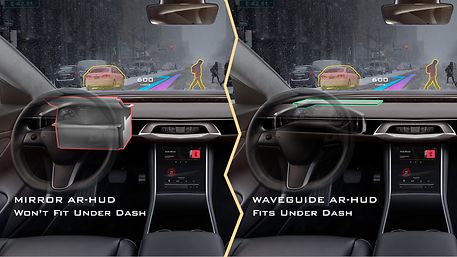Continental increases its investment in Silicon Valley-based DigiLens to close to 18 percent
Promising results of joint development for automotive waveguide head-up displays are paving the way for augmented reality
Thorsten-Alexander Kern (Continental) joins DigiLens’ Board of Directors
Auburn Hills, Mich., May 17, 2018 – The technology company Continental is increasing its investment in DigiLens Inc., the Silicon Valley-based leader in holographic waveguide projection technology. With its additional investment, Continental will hold close to 18 percent of DigiLens after Series C financing round. Continental first invested in DigiLens in 2016 through a strategic partnership to jointly develop a waveguide head-up display (HUD) that fulfills automotive requirements, the technology is now ready for industrialization.
DigiLens’ holographic waveguide technology enables head-up displays for different applications including automotive, aviation and motorcycle helmets. The company’s AutoHUD waveguide product transforms the HUD performance by doubling the field of view making a much larger display required for augmented reality applications, while reducing the component volume to one-sixth of the traditional size.
“By reducing the size of head-up displays, this waveguide technology truly holds the potential to revolutionize the market,” said Thorsten-Alexander Kern, Head of HUD Product Development at Continental’s business unit Instrumentation & Driver HMI and member of the DigiLens Board of Directors. “Seeing the first promising results, we are happy that we could increase our investment in DigiLens and further work together in order to bring this exciting technology on the road.”
Instead of using mirrors to direct and magnify the images in a head-up display, the waveguide technology is diffracting the light, thus reducing hardware and the volume in the vertical axis. Especially, for large projections, as needed for augmented reality, mirror-based head-up displays require a lot of space in the dashboard of a vehicle, which is mostly not available.

The AutoHUD waveguide product transforms the HUD performance by doubling the field of view, making a much larger display required for augmented reality applications, while reducing the component volume. © Continental AG
“Based on the waveguide technology, we see a great potential to realize augmented reality head-up displays also for a broad market,” Kern said.
“As a result of strong encouragement after several customer demonstrations, we are excited to intensify our joint efforts and accelerate development. Continental’s support at the highest level is a testament to their enthusiasm and our common values,” said Chris Pickett, CEO of DigiLens. “Engineers from both of our companies are pioneering a disruptive solution.”
About Continental
Continental develops pioneering technologies and services for sustainable and connected mobility of people and their goods. Founded in 1871, the technology company offers safe, efficient, intelligent and affordable solutions for vehicles, machines, traffic and transportation. In 2017, Continental generated sales of €44 billion and currently employs more than 240,000 people in 61 countries.
About DigiLens
DigiLens’ waveguide optics allow OEMs to access eyeglass-thin displays for wearable AR applications and larger displays for automobiles, avionics, retail and architecture. The company has developed a high-performance photopolymer material and copy process to manufacture precision diffractive optics by printing (not etching) the nanostructures. The resultant eyeglass display has higher efficiency and a wider field of view compared to conventional waveguides. This unique process delivers the key low-cost manufacturing benefit for DigiLens strategic partners, including Panasonic, Sony, Continental, Rockwell Collins and Foxconn.
More information about the company’s offerings can be found at www.digilens.com.
